Introduction: Thorstein Veblen's Elusive Project
Published online by Cambridge University Press: 10 January 2018
Summary
Thorstein Veblen ranks among the more elusive but also rewarding and provocative thinkers in the classic tradition of social theory. Of course he is known best as the author of The Theory of the Leisure Class (1899), as sharp witted a satire of upper- class folly as was ever penned. The book's key concept of conspicuous consumption rooted itself in everyday language: millions who have never heard of Veblen use his term every day. But Veblen's first book is more than a wisecracking comedy of manners. It is an early important statement of his essentially evolutionary, Darwinian approach to explaining social institutions. It also rests on the crucial Veblenian distinction between industry and exploit, an idea that evokes the anthropological outlook he applied throughout his later explorations of social behavior. So while the book is a resounding critique of Gilded- Age American values— Veblen loved to remind patriotic American readers of their rabid affection for the trappings of European aristocratic culture— the book's theoretical preoccupations should not be underestimated. They show us that Veblen and his outlook were grounded in more than his efforts at satire of his American setting and rural Minnesota upbringing. Such elements, for all their formative influence, were just that, points of departure for an insatiable curiosity and an intellectual project that was fundamentally theoretical in character and direction.
Veblen emerged from rural Minnesota to engage with thinkers, ideas and modes of analysis that reflected the deep reservoir of Western thought. Paying little heed to disciplinary boundaries, his writings transcend formulaic distinctions between economics, sociology, politics and psychology. Veblen alerts his readers to institutional intersections, to associations and linkages, to the tissue and fiber of connections between material and cultural life and the ways these inform political habits and constraints. Here are the sources of Veblen's provocation.
Human beings are creatures of habit, he never fails to remind us; we live and work within long- established institutional grooves. But for all that, Veblen sees human beings as creatures that act. Humans live by doing things, by adapting to changing circumstance, however belatedly, and not by pure rote either. “Man's life is activity,” wrote Veblen, “and as he acts, so he thinks and feels” (1898, 85). People modify their ways and means to meet pressures and changes in situation and environment.
- Type
- Chapter
- Information
- The Anthem Companion to Thorstein Veblen , pp. 1 - 18Publisher: Anthem PressPrint publication year: 2017



